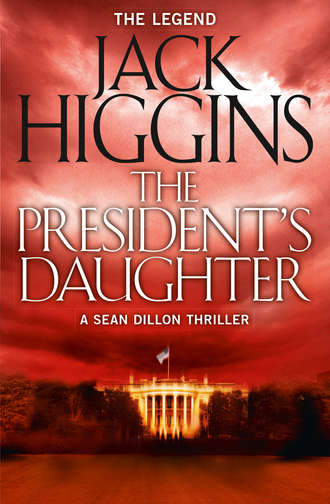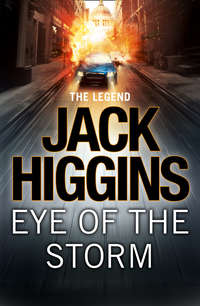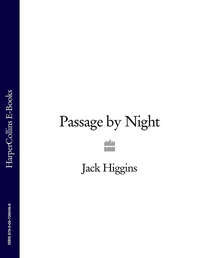
Полная версия
The President’s Daughter
He parked his Jeep outside the Excelsior, went in and ran up the stairs, excited as a schoolboy. He knocked on the door of her suite and she opened it, her face wet with tears, and flung her arms around his neck.
‘Oh, Jake, thank God you’re here. I was just leaving. I didn’t know if I’d see you.’
‘Leaving? But…but what happened?’
‘They’ve found Jean. He’s not dead, Jake! A patrol picked him up in the bush, he’s badly wounded; they flew him down this morning. He’s at Mitchell Military Hospital. Will you take me?’
Jake felt the room spinning around him, but he spoke carefully. ‘Of course I will. I’ve got my Jeep outside. Is there anything you need?’
‘No, Jake, just get me there.’
Already, she was slipping away from him, like a boat making for different waters and not his.
At the hospital, he peered through the glass in the door of the private room and saw the man who was Captain Comte Jean de Brissac lying there, his head heavily bandaged, Jacqueline at his side with a doctor. They came out together.
Jake said, ‘How is he?’
It was the doctor who answered. ‘A bullet creased his skull and he was half-starved when they found him, but he’ll live. You’re both very lucky.’
He walked away, and Jacqueline de Brissac smiled through her tears. ‘Yes, aren’t we?’ Her voice caught. ‘Oh, God. What do I do?’
He felt incredibly calm, knowing that she needed his strength. The tears were streaming down her face and he took out his handkerchief and wiped them away gently. ‘Why, you go to your husband, of course.’
She stood there looking at him, then turned and opened the door into the private room. Cazalet went down the corridor to the main entrance. He stood on the top step and lit a cigarette.
‘You know what, Jake, I’m damn proud of you,’ he said softly and then he marched very fast towards the Jeep, trying to hold back the tears that were springing to his eyes.
When his time was up, he returned to Harvard and completed his doctorate. He joined his father’s law firm, but politics beckoned inevitably: congressman first and then he married Alice Beadle when he was thirty-five, a pleasant, decent woman for whom he had a great affection. His father had pushed for it, feeling it was time for children, but there weren’t any. Alice’s health was poor and she developed leukaemia, which lasted for years.
Over the years, Jake was aware of Jean de Brissac’s rise to the rank of full general in the French army. Jacqueline was a memory so distant that what had happened seemed like a dream; and then de Brissac died of a heart attack. There was an obituary in the New York Times, a photo of the General with Jacqueline. On reading it, Cazalet discovered there was only one child, a daughter named Marie. He considered writing, but then thought better of it. Jacqueline didn’t need an embarrassing echo of the past. What would be the point?
No, best to leave well enough alone.…
Once elected senator and regarded as a coming man, he had to take trips abroad on government business, usually on his own, for Alice simply wasn’t up to it. So it was that in Paris in 1989 on government business, he was once again on his own, except for his faithful aide and private secretary, a one-armed lawyer named Teddy Grant. Among other things there was an invitation to the Presidential Ball. Cazalet was seated at the desk in the sitting room of his suite at the Ritz when Teddy dropped it in front of him.
‘You can’t say no, it’s a command performance like the White House or Buckingham Palace, only this is the Elysée Palace.’
‘I haven’t the slightest intention of saying no,’ Cazalet told him. ‘And I’d like to point out it says Senator Jacob Cazalet and companion. For tonight, that means you, Teddy, so go find your black tie.’
Oh, I don’t mind,’ Teddy told him. ‘Free champagne, strawberries, good-looking women. For you, anyway.’
‘Good-looking French women, Teddy. But I’m not in the market any more, remember. Now get out of here.’
The ball was everything one could have hoped for, held in an incredible salon, an orchestra playing at one end. All the world seemed to be there, handsome men, beautiful women, uniforms everywhere, church dignitaries in purple or scarlet cassocks. Teddy had departed to procure some more champagne and Cazalet stood alone on the edge of the dance-floor.
A voice said, ‘Jake?’
He turned around and found her standing there, wearing a small diamond tiara and a black silk ballgown. ‘My God, it’s you, Jacqueline.’
The heart turned over in him as he took her hands. She was still so beautiful, it was as if time had stood still. She said, ‘Senator Cazalet now. I’ve followed your career with such interest. A future president, they say.’
‘And pigs might fly.’ He hesitated. ‘I was sorry to hear of your husband’s death last year.’
‘Yes. It was quick, though. I suppose one can’t ask for more than that.’
Teddy Grant approached with a tray holding two glasses of champagne. Cazalet said, ‘Teddy, the Comtesse de Brissac…an old friend.’
‘Not the Teddy Grant from that Harvard cafeteria?’ she smiled. ‘Oh, I truly am pleased to meet you, Mr Grant.’
‘Hey, what is this?’ Teddy asked.
‘It’s OK, Teddy, go and get another glass of champagne and I’ll explain later.’
Teddy left, looking slightly flummoxed, and he and Jacqueline sat down at the nearest table. ‘Your wife isn’t with you?’ she asked.
‘Alice has been fighting leukaemia for years.’
‘Oh, I’m sorry.’
‘She’s a brave woman, but it dominates her life. That’s why we didn’t have any kids. You know, it’s ironic. My father, who died last year, too, urged me to marry Alice because he thought I should have a family. People worry about politicians who don’t.’
‘Don’t you love her?’
‘Oh, I have a great deal of affection for Alice, but love?’ He shook his head. ‘I’ve only known love once.’
She touched his arm. ‘I’m sorry, Jake.’
‘So am I. We all lost – Alice, you, and me. I sometimes think I came off worst, having no kids.’
‘But you do, Jake,’ she said gently. Time seemed to stop for Jake. ‘What do you mean?’ he said at last.
‘Look over there, just at the French window to the terrace,’ Jacqueline said.
The girl’s hair was long, the white dress very simple. For a heart-stopping moment, it might have been her mother.
‘You wouldn’t kid a guy,’ he whispered.
‘No, Jake, that would be too cruel. She was conceived that one night in Saigon, and born in Paris in 1970. Her name is Marie and she is halfway through her first year at Oxford.’
Jake couldn’t take his eyes off the girl. ‘Did the General know?’
‘He assumed she was his, or so I thought, until the end, when the doctors told him just how bad his heart was.’
‘And?’
‘It seems that while he was in the hospital in Vietnam after being found up-country, someone sent him a letter. It told him that his wife had been seen with an American officer, who had not left her suite until four o’clock in the morning.’
‘But who –?’
‘A member of staff, we think. The maliciousness of it! Sometimes I despair of human beings. But he had known, all this time, my dear Jean. Before he died, he signed a declaration under the provisions of the Code Napoléon, stating that he was Marie’s titular father. It was to preserve her position and title legally.’
‘And she doesn’t know?’
‘No, and I don’t want her to, and neither do you, Jake. You’re a good man, an honourable man, but a politician. The great American public doesn’t take kindly to politicians who have illegitimate daughters.’
‘But it wasn’t like that. Dammit, everyone thought your husband was dead.’
‘Jake, listen to me. You could be president one day, everybody says that, but not with this sort of scandal hanging over you. And what about Marie? Isn’t it better if she just lives with her memory of her father, the General? No, if Marie isn’t told, that leaves only two people in the world who know – you and me. Are we agreed?’
Jake gazed at the lovely girl by the window, and then back at her mother. ‘Yes,’ he said. ‘Yes, you’re right.’
She took his hand. ‘I know. Now…would you care to meet her?’
‘My God, yes!’
She led the way to the French windows. ‘She has your eyes, Jake, and your smile. You’ll see.’
Marie de Brissac turned from speaking to a handsome young officer. ‘Mama,’ she smiled. ‘I’ve said it before, but you look incredible in that dress.’
Jacqueline kissed her on both cheeks. ‘Thank you, chérie.’
Marie said, ‘This is Lieutenant Maurice Guyon of the French Foreign Legion, just back from the campaign in Chad.’
Guyon, very military, very correct, clicked his heels and kissed Jacqueline’s hand. ‘A pleasure, Countess.’
‘And now allow me to introduce Senator Jacob Cazalet from Washington. We’re good friends.’
Guyon responded with enthusiasm. ‘A pleasure, Senator! I read the article about you last year in Paris Soir. Your exploits in Vietnam were admirable, sir. A remarkable career.’
‘Well, thank you, Lieutenant,’ Jake Cazalet said. ‘That means a lot, coming from someone like you.’ He turned and took his daughter’s hand. ‘May I say that, like your mother, you look wonderful.’
‘Senator.’ She had been smiling, but now it faded and there was only puzzlement there. ‘Are you sure we haven’t met before?’
‘Absolutely.’ Jake smiled. ‘How could I have possibly forgotten?’ He kissed her hand. ‘Now, if you’ll excuse me, I’d like to dance with your mother.’
As they circled the floor, he said to Jacqueline, ‘Everything you said – everything – is true. She’s wonderful.’
‘With such a father, she would be.’
He looked down at her with enormous tenderness. ‘You know, I think I never stopped loving you, Jacqueline,’ he said. ‘If only.…’
Hush,’ she said, putting her fingers to his lips. ‘I know, Jake, I know. But we can be happy with what we have.’ She smiled. ‘Now, let’s put some life into those feet, Senator!’
He never saw her again. The years rolled on, his wife finally died from the leukaemia that had plagued her for years, and it was a chance meeting with the French Ambassador at a function in Washington three years after the Gulf War that brought him up to date. He and Teddy were standing with him on the lawn at the White House.
The Ambassador said, ‘Congratulations would seem in order. I understand the presidential nomination is yours for the asking.’
‘A little premature,’ Jake said. ‘There’s still Senator Freeman, if he decides to run.’
‘Don’t listen to him, Mr Ambassador, he can’t fail,’ Teddy said.
‘And I must believe you.’ The Ambassador turned to Cazalet. ‘After all, as everyone knows, Teddy is your éminence grise.’
‘I suppose so.’ Jake smiled. Then, he didn’t know why – was it the music? – he said, ‘Tell me, Ambassador, there’s a friend of mine I haven’t seen in many years, the Comtesse de Brissac – do you know her?’
An odd expression came over the Ambassador’s face, then he said, ‘Mon Dieu, I was forgetting. You saved her life in Vietnam.’
‘Hell, I’d forgotten that one,’ Teddy said. ‘That’s how you got your DSC.’
‘You are not in touch?’ the Ambassador said.
‘Not really.’
‘The daughter was engaged to a Captain Guyon, a fine boy. I knew the family. Unfortunately, he was killed in the Gulf.’
‘I am very sorry to hear that. And the Countess?’
‘Cancer, my friend, at death’s door, as I understand it. A great pity.’
Cazalet said to Teddy, ‘I’ve got to get out of here, and fast. Two things.’ He was walking rapidly along a White House corridor. ‘Get in touch with our embassy in Paris and check on the present condition of the Comtesse de Brissac, then phone the airport and tell them to get the Gulfstream ready for a flight to Paris.’
His mother’s death a couple of years before had left him very wealthy, although with his interest in politics, he was content to put it all in a blind trust and leave the finances to others. However, it did give him the privileges of rank and the Gulfstream private jet was one of them.
Teddy was already speaking over his mobile phone, and as they reached the limousine, he said, ‘They’ll call me.’ They got in the rear and he closed the glass partition between them and the driver. ‘Jake, is there trouble? Anything I should know about?’
Cazalet did an unusual thing for him during the day. He reached for the bar and selected a crystal glass. ‘Pour me a Scotch, Teddy.’
‘Jake, are you OK?’ Teddy said anxiously.
‘Sure I am. The only woman I ever truly loved is dying of cancer and my daughter is all alone, so give me a Scotch.’
Teddy Grant’s eyes widened and he poured. ‘Daughter, Jake?’
Cazalet took the Scotch down in one swallow.
‘That was good,’ he said, and then he told him everything.
In the end, the mad dash across the Atlantic proved fruitless. Jacqueline de Brissac had died two weeks before. They had missed the funeral by five days. Cazalet seemed to find himself moving in slow motion and it was Teddy who saw to everything.
‘She was laid to rest in the Brissac family mausoleum, that’s in a cemetery at Valence,’ he said, turning from the phone in their suite at the Ritz.
‘Thanks, Teddy, we’ll pay our respects.’
Cazalet looked ten years older as they settled in the limousine, and Teddy Grant cared for him more than any other person on this earth, more even than he cared for his long-term partner, who was a professor of physics at Yale.
Cazalet was the brother he’d never had, who’d taken interest in his career ever since the cafeteria incident at Harvard, had given him a job with the family law firm, had given him the totally unique job of being his personal assistant, and Teddy had grabbed it.
Once, at a Senate committee meeting, he’d sat at Cazalet’s shoulder, monitoring and advising on the proceedings. Afterwards, a senior White House liaison had come up to Cazalet, fuming.
‘Hell, Senator, I truly object to this little cocksucker constantly appearing at these proceedings. I didn’t ask for fags on this committee.’
The room went quiet. Jake Cazalet said, ‘Teddy Grant graduated magna cum laude at Harvard Law School. He was awarded the Bronze Star for bravery in the field in Vietnam and the Vietnamese Cross of Valor. He also gave an arm for his country.’ His face was terrible to see. ‘But more than that, he is my friend and his sexual orientation is his own affair.’
‘Now, look here,’ the other man said.
‘No, you look here. I’m off the committee,’ and Cazalet had turned to Grant. ‘Let’s go, Teddy.’
In the end, when the President had heard, it was the White House staffer who got moved, not Jake Cazalet, and Teddy had never forgotten that.
It was raining at the cemetery and slightly misty. There was a small records office, with a clerk on duty, and Teddy went in to find the location. He returned with a piece of paper and a single rose in a Cellophane holder, got in the limousine and spoke to the driver.
‘Take the road north, then left at the top. We’ll get out there.’
He didn’t say anything to Cazalet, who sat looking tired and tense. The cemetery was old and crowded with a forest of Gothic monuments and gravestones. When they got out, Teddy raised a black umbrella.
‘This way.’ They followed a narrow path. He checked the instructions on the paper again. ‘There it is, Senator,’ he said, strangely formal.
The mausoleum was ornate, with an angel of death on top. There was an arched entrance to an oaken door banded with iron and the name de Brissac.
‘I’d like to be alone, Teddy,’ Cazalet told him.
‘Of course.’ Teddy gave him the rose and got back into the limousine.
Jake went into the porch at the door. There was a tablet listing the names of members of the family laid to rest there, but there was a separate one for the General. Jacqueline de Brissac’s name was in gold beneath it and newly inscribed.
There were some flower holders and Jake took the rose from its wrapping, kissed it and slipped it into one of the holders, then he sat down on the stone bench and wept as he had never wept in his life before.
A little while later – he didn’t know how long – there was a footstep on the gravel, and he looked up. Marie de Brissac stood there, wearing a Burberry trenchcoat and a headscarf. She held a rose just like his own and Teddy Grant stood behind her, his umbrella raised.
‘Forgive me, Senator, this is my doing, but I thought she should know.’
‘That’s all right, Teddy.’ Cazalet was filled with emotion, his heart beating.
Teddy went back to the limousine and the two of them were left staring at each other. ‘Don’t be mad at him,’ she said. ‘You see – I already knew. My mother told me a year or two after we met at the ball, when she was first ill. It was time, she said.’
She put her rose into one of the other holders. ‘There you are, Mama,’ she said softly. ‘One from each of us, the two people in the world who loved you best.’ She turned and smiled. ‘So here we are, Father.’
As Cazalet wept again, she put her arms around his neck and held him close.
Afterwards, sitting on the bench, holding hands, he said, ‘I must put things right. You must allow me to acknowledge you.’
‘No,’ she said. ‘My mother was adamant about that, and so am I. You are a great senator, and as president of the United States of America you could achieve remarkable things. Nothing must spoil that. An illegitimate daughter is the last thing you need. Your political opponents would have a field day.’
‘Screw them.’
She laughed. ‘Such language from a future president. No, my way is best. Only you and I know, the perfect cover.’
‘And Teddy.’
‘Ah, yes, lovely Teddy. Such a good man and your true friend. My mother told me about him. You mustn’t be annoyed that he spoke to me.’
‘I’m not.’
She raised her voice. ‘Teddy, come here.’
Teddy Grant got out of the limousine and joined them. ‘I’m sorry, Jake.’
‘You did right, Teddy, I’m grateful, but she won’t allow me to go public. Tell her she’s wrong.’
‘No, I’m afraid she’s right. You could cripple your chances. The opposition would make it look real dirty. That’s politics.’
Jake’s heart churned, but in his head, he knew they were both right. Damn it! ‘All right.’ Cazalet turned to her, still holding her hand. ‘But we must see each other on a regular basis.’
She smiled gently and raised her eyebrows to Teddy, who said, ‘I’m sorry, Jake, but there would be talk. Hell, the press would jump on it. They’d think you’d found yourself a new girlfriend.’
Cazalet’s shoulders sagged. She touched his face gently. ‘Perhaps the odd occasion, some public function. You know the kind of thing.’
‘God, but this is painful,’ he said.
‘You are my father and I love you, and not because you were that glorious young war hero who saved my mother in some God-forsaken swamp. It’s the decency of a man who nursed his wife through an appalling illness to the very end and never wavered that I admire. I love you, Jake Cazalet, for yourself, and I’m truly glad to be your daughter.’ She held him close and turned to Teddy, who had tears in his eyes. ‘Look after him, Teddy, I’m going now.’ She stepped out into the rain and walked away.
‘God help me, Teddy, what am I going to do?’ Jake Cazalet said brokenly.
‘You’re going to make her proud of you, Senator. You’re going to be the best damn president our country has ever seen. Now let’s go.’
As they walked to the limousine, Cazalet said, ‘Kennedy was right. Anyone who believes in fairness in this life has been seriously misinformed.’
‘Sure, Senator, life’s a bitch, but it’s all we’ve got,’ Teddy said, as they got into the limousine. ‘Oh, and by the way, I just had a call on my mobile. Senator Freeman’s decided not to run. The nomination is yours. We’re on our way.’
2
Rain swept in across London from the west during the night, driven by a cold wind, hard and relentless. By morning, the wind had dropped, but when the prison officer in navy-blue mackintosh opened the gate to the exercise yard at Wandsworth Prison, the rain itself was more relentless than ever. The officer was called Jackson and sported a clipped military moustache, which was hardly surprising as he was a former Grenadier Guard.
He pushed Dermot Riley forward. ‘On your way.’
Riley, dressed only in prison denims, peered out. The yard, surrounded by high brick walls, was empty.
‘I’ll get soaked,’ he said in a hard Ulster accent.
‘No, you won’t. I’m being good to you.’ Jackson held out a small folding umbrella.
‘I’d rather go back to my cell,’ Riley said morosely.
‘One hour’s exercise a day, that’s what it says in regulations, then we bang you up for the other twenty-three. Can’t have you associating with honest crooks, can we? You know how much they’d like to get their hands on a piece of IRA scum like you. That bomb in the West End last week killed sixteen people and God knows how many injured. You’re not popular, Riley, not popular at all. Now get on with it.’
He shoved Riley into the rain and locked the door behind him. Riley pressed the button on the folding umbrella and it opened. He took a tin of cigarettes from a pocket, lit one with a cheap plastic lighter and started to walk.
Funny how walking in the rain gave him a lift and the cigarette tasted good. On the other hand, anything was better than the solitary life he led for twenty-three hours a day in that cell. So far he had endured six months of it, which only left fourteen and a half years to go. Sometimes he thought he was going mad when he considered the prospect of those years stretching into infinity. It wouldn’t have been so bad if they’d sent him back home to a prison in Ulster. At least he’d have been serving his time with old comrades, but here at Wandsworth.…
At that moment the door opened and Jackson appeared. ‘Get over here, Riley, you’ve got a visitor.’
‘A visitor?’ Riley said.
‘Yes, your brief.’ Riley stood there in the rain, the umbrella over his head and Jackson added impatiently, ‘Your brief, your lawyer, you stupid Irish git. Now move it.’
Jackson didn’t take him to the general visiting hall, but opened a door at the end of a side corridor. There was a table, a chair at each end and a large barred window. The man who stood there peering out of it wore a fawn Burberry trenchcoat over a dark brown suit. The white shirt was set off by a college-type striped tie. He had black curling hair a pleasant, open face and horn-rimmed spectacles. He looked around forty.
‘Ah, Mr Riley. I don’t know whether you will remember me. I was in court the day you were sentenced. George Brown.’
Riley played it very cool indeed. ‘Oh, yes.’
‘I’ve been retained to look into the question of an appeal on your case. There were certain irregularities, statements by witnesses which might well have been tainted.’ He turned to Jackson, who stood by the door. ‘I wonder if you’d mind stepping outside, Mr…?’
‘Jackson, sir’.
‘I think you’ll find if you check Section Three regulations, that where a question of appeal is being considered, a lawyer and his client are entitled to privacy.’
‘Suit yourself,’ Jackson said.
The door closed behind him, and Riley said, ‘What the hell is going on? I’ve never seen you in my life before and I’ve already had any hope of an appeal turned down by the Home Secretary.’
Brown took a leather cigarette case from his inside pocket and offered him one. ‘Fifteen years,’ he said, as he gave Riley a light. ‘That’s a long time. Bad enough here, but they’ll be sending you to Parkhurst on the Isle of Wight soon. Toughest nick in Britain and the hardest cons. Like the coffin lid closing when they get you in there. I know about these things. I am a lawyer, although naturally, my name isn’t Brown.’









